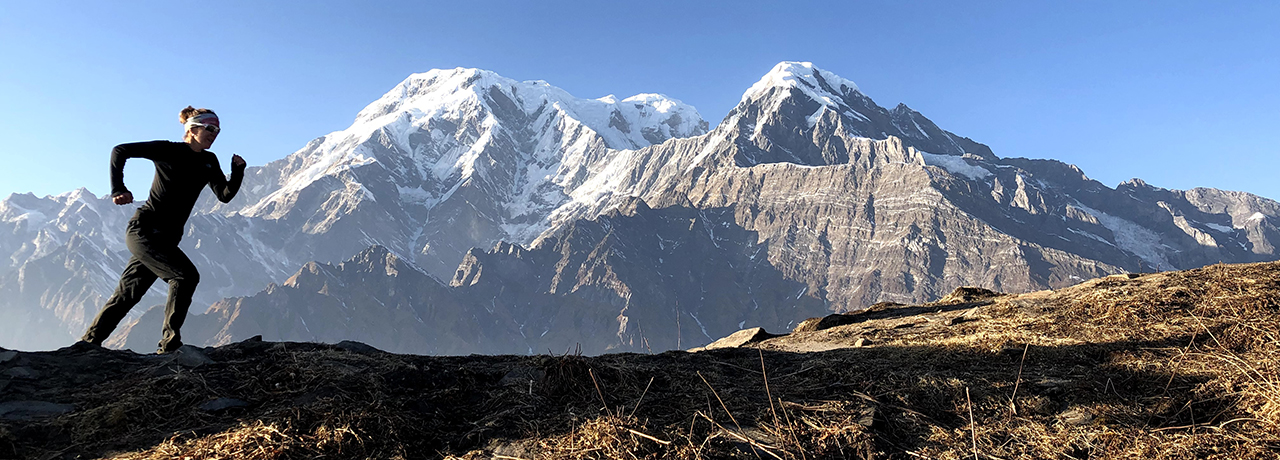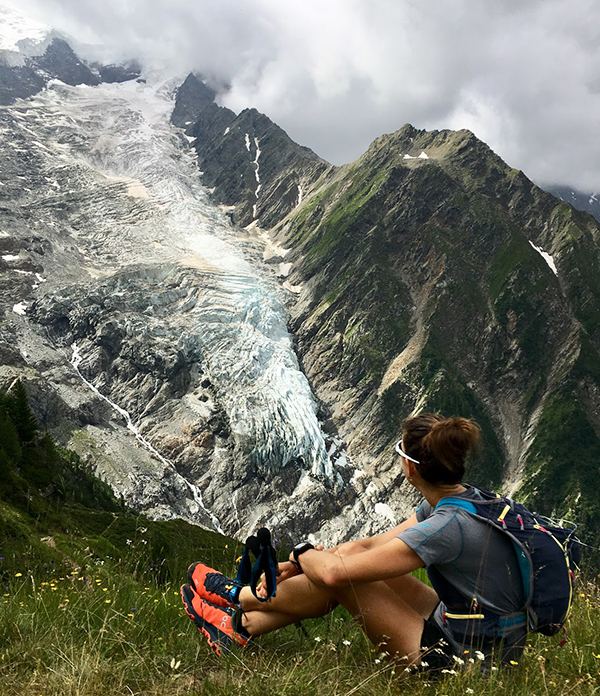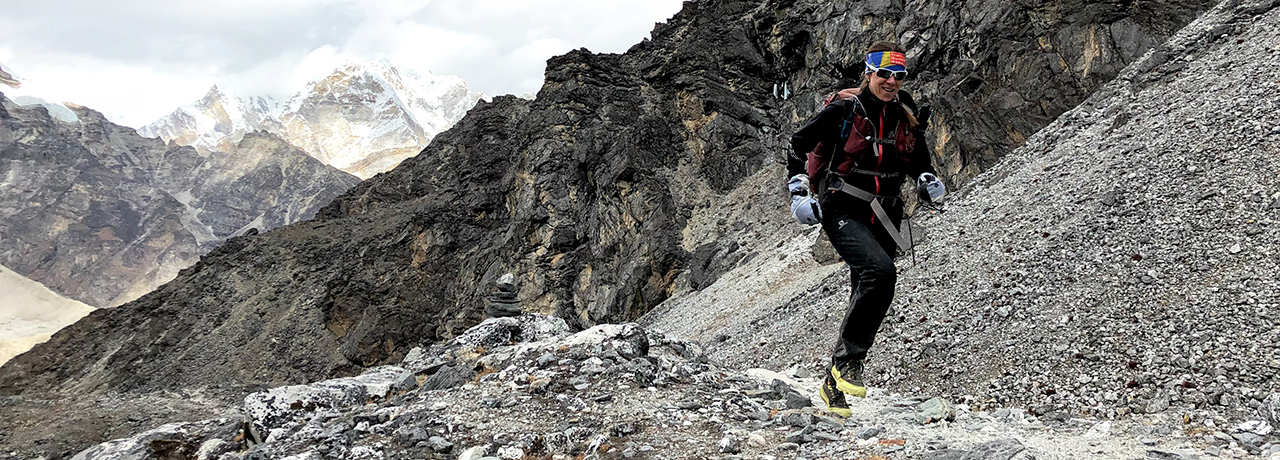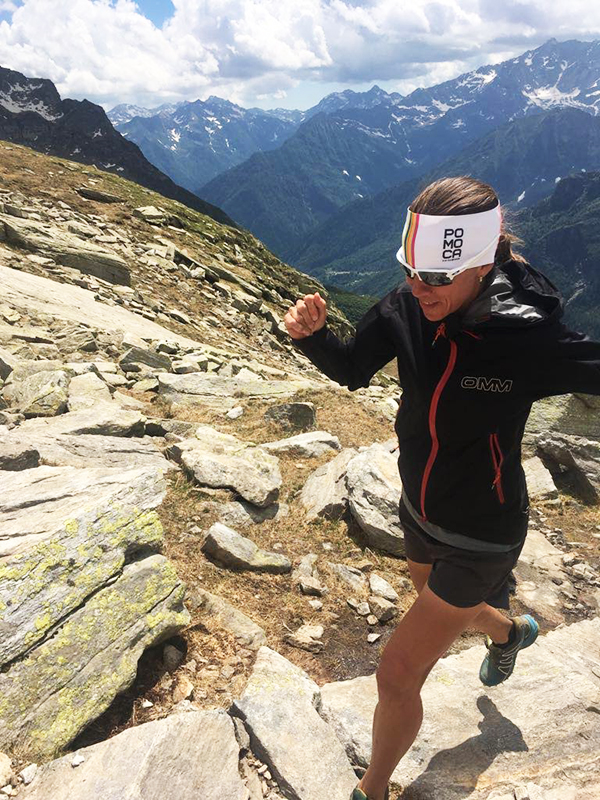
I have been from what felt like the world’s darkest place in the Bavarian countryside to the highest Himalayan trails here in Nepal. I am at a place where I see the profile of the mountains from afar – steep ascents, descents and sheer vertical drops – and feel gratitude. Life’s most challenging mountains have cultivated my inner strength, leading me on a trail of immeasurable personal growth.
I have limited memory of the whirlwind following my accident in 2014. As I spent nearly two days alone in my farmhouse apartment nursing a black eye with a bag of frozen berries, my brain was bleeding and swelling between traumatic skull fractures. Visitors and caregivers from my time in intensive care soon after are all a mysterious fog.
There would be no trail back to who I was before my traumatic brain injury. The trail ahead would be one of discovery; one of learning that I am stronger than I ever could have imagined; one of learning that I am resilient like a mountain that weathers perpetual storms.

Destiny blew me off my map. But resilience led me here, reflecting by the fire in a Nepalese tea house. From death’s doorstep to the shadows of Mount Everest, I embrace every stride on the trail that is life.
Rising after the storm was painfully slow: thunderous throbbing, my head held awkwardly to see with the only vision I had from my bloodied left eye, my balance off kilter and my gait an unstable teeter. I struggled to adjust to the pace at which I could explore my physical limits, manage my brain injury symptoms and accept the healing process.
Though a blow to my head knocked me into an unfamiliar world of beeping monitors, sickening scents, bedpans and foreign languages, I expected miracles of my battered body. Countless hours were spent curled up and exhausted in a dark therapy room, painfully disappointed in my weakness and the direction my trail had taken.
My hope, sleep and appetite were all diminishing. Months on, therapy became a monotonous routine, offering no signs of improvement to the state of my eyes, the state of my appetite, or the state of my heart. I had no strength to endure and struggled to accept that living with a physical disability could be worth weathering the storm.
Amidst the darkness of neurorehabilitation, it became clear that something more than my eyesight was missing. My severely damaged brain was not getting the nutrition needed to fuel its healing. I believed I could navigate a trail out of the storm without nourishment. Suddenly, there was no trail and I was dangerously lost.
Confined in a German neurorehabilitation hospital, my acutely dangerous body mass index ignited a frantic search for relocation to specialized critical care. Labeled anorexic, I felt my identity and hope withering with my weight. I was a visually impaired, non-German speaking, single, expatriate, anorexic drowning in the wake of a traumatic brain injury. The storm raged.

My brother, Ryan, flew to Germany from Canada, bridging the gaps between a bloated bureaucratic mess of hospital legislation, insurance idiosyncrasies and residency restrictions. Eventually, I travelled back to Canada, but the Ontario health care facility I was admitted to said it could not provide the necessary treatment to keep me alive. Still too weak to walk, I was transferred to a facility in Colorado.
A more specialized medical team began analyzing the area of my brain that took the blow, as well as my symptoms and behaviours. Instead of anorexia, I was diagnosed with avoidant restrictive food intake disorder, characterized by persistent starvation due to my avoidance of food following the accident. A scar from the hole in my abdomen necessary to feed me for months will forever serve as a reminder of the storm I have survived.
After seven months of intense treatment, weight restoration, rehabilitation and therapy, I found myself making my way to Denver International Airport. I inhaled freedom, yet holding that breath I felt lost. I had become accustomed to rigid routines and was now a pin dropped on a map with no directions, no home, no driver’s license and limited vision. I needed to get to know this stranger I had become, to accept and embrace her wholeheartedly.
Holding on to the past and wishing life was different were only shackles constraining my trail ahead. I needed to embrace the changes. All signs pointed to mountains.

Seeking to embrace change after my treatment in Colorado, I set an ambitious goal: to run 13 massifs around the world in a single year. Perhaps it is their tenacious, resilient nature that attracts me to mountains.
Since setting my goal, I have run in the French, Swiss and Julian Alps, the Himalayas, the Andorra Pyrenees, the Italian Dolomites, as well as on mountain trails in Iceland, New Zealand, Patagonia, Peru and the U.S. My path has led me through stunning alpine meadows, high above treelines, over glacial passes, around stunning gorges and even through dark tunnels. It is a journey that has made my heart happy.
No super-powered genie, GPS, quiet reflection or rumination can change the direction an accident sent my life. No textbook, seminar or lab could teach the lessons I have learned from the detour, which for an eternity felt like a dead end.
When the trail gets rocky, or my gait wobbles as I navigate a narrow ridge, or a trail splits in questionable directions, I embrace impermanence. Falling is how I grow. Getting up and striding on is resilience.
This chapter of my life has included change, risks, growth and courage I never imagined. I stride ahead with gratitude and an open mind – blank pages with endless opportunity.
Wherever life lands me, I have the power to choose my perspective, the power to embrace the life I nearly lost. Perspective can make challenges appear mountainous or possibilities look infinite. Though my eyesight has narrowed, my perspective has widened and I see only mountains of opportunity ahead.
Learn more about Jill Wheatley's journey by visiting her website, mountainsofmymind.com.